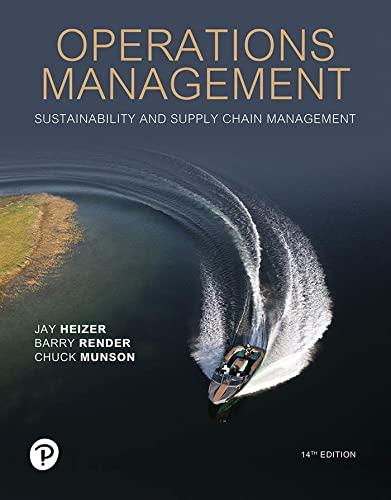Premier Bicycle Company, located in Knoxville, Tennessee, knows that the strength of its extensive supply chain is
Question:
Premier Bicycle Company, located in Knoxville, Tennessee, knows that the strength of its extensive supply chain is a key factor in its production success. The 90-year-old company is the nation’s premier manufacturer of off-the-road mountain bikes, with prices ranging from $2,800 to $8,000. Exceptional product quality is essential to a loyal and growing customer base along with enduring profitability and reputation of the firm. And its longstanding and loyal suppliers have made Wendy Cohen’s job of purchasing manager a relatively smooth one—that is, until the 2020 COVID-19 pandemic. With over 40 suppliers providing more than 1,000 SKUs ranging from common items such as handlebars (in 18 configurations) to wheels (15 options including the $1,800 carbon enduro 29-inch boost wheel) to seats—and to components most laypersons can’t even name, such as headset caps, cogalicious cogs, cable guide chucks, and lock-on bar plugs, Wendy knew that any missing link could damage her sensitive JIT logistics system and customer loyalty. When COVID-19 shuttered her plant in April–June 2020, 90% of Premier’s 180 workers were placed on furlough, and production ground to a halt. With new safety measures (distancing, masks, sanitizers, etc.) in place as the economy began to reopen in July 2020, Premier geared up for normal production. But an amazing change occurred during the summer of 2020. Instead of demand drying up during the shutdown, Americans decided that not working, or staying home to work, meant less need for their cars and SUVs. By the hundreds of thousands, they instead took to the road on bicycles. At which point, retailers ranging from Walmart to local bike shops found their inventories sold out and the supply chain that provided bikes depleted or at a standstill. At one point in August, it became almost impossible to find a specialty bike of any sort. This exploding demand portended good news to Premier and its many competitors of lesser-priced bicycles. Wendy’s boss ordered the plant to resume full production capacity to meet the surprising backlog. Wendy contacted each supplier and immediately prepared to revise economic order quantities based on the newest forecasts. Unfortunately, to her dismay, three of her suppliers had gone out of business—unable to cover their costs with no revenues during the economic shutdown. Others were slowly gearing up, trying to return furloughed workers back to the production line even though many remained fearful of catching the virus at work. The supply chains for specialty bikes such as Premier’s are thin. In some cases, there are only one or two producers of small, but critical parts. Working 16-hour days, Wendy and her staff scoured the world for parts. Some were air-expressed from new European suppliers. Others required more novel and desperate approaches. In one case, Wendy even formed an alliance with the purchasing group at Dynamic Bicycle Co., a small and lower-end producer also located in Knoxville. Her counterpart could indeed share several SKUs that Wendy could then modify for Premier’s products—and vice versa. Nonetheless, because of the disruption, sales dropped nearly 20% in 2020 as the supply chain very slowly mended. Wendy and her firm needed a new road map.
Discussion Questions
1. What can Wendy do to prevent such disruption in the future?
2. What mistakes did Premier make with respect to its suppliers?
3. What will Premier need to do when forecasting sales in the next few years?
4. What are the disadvantages of an alliance, such as that made with Dynamic?
Step by Step Answer:

Operations Management Sustainability And Supply Chain Management
ISBN: 9780137476442
14th Edition
Authors: Jay Heizer, Barry Render, Chuck Munson





